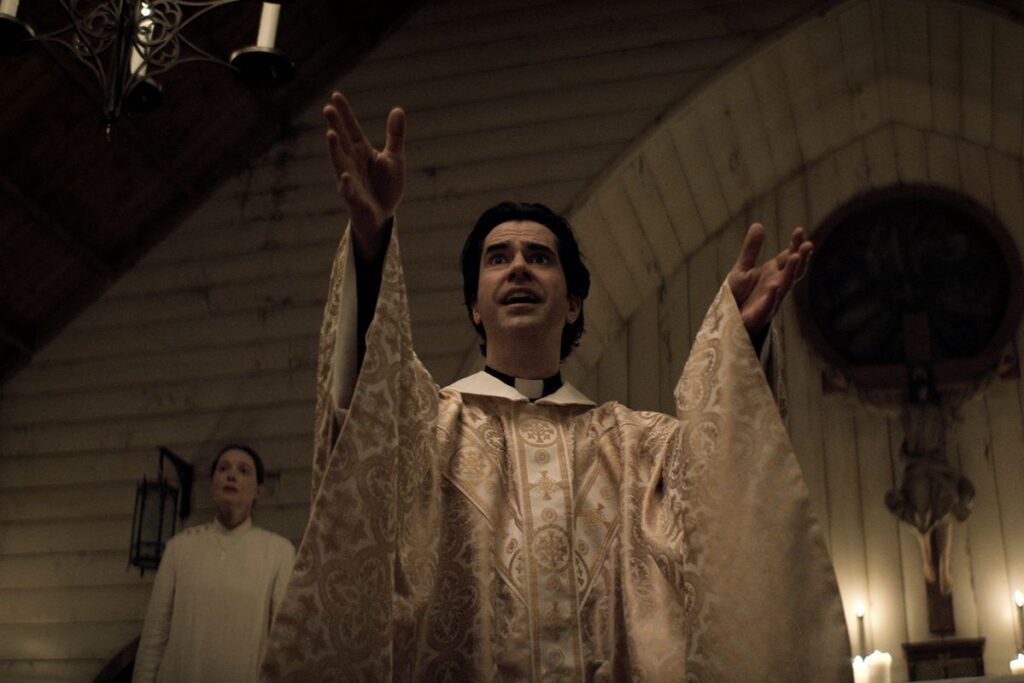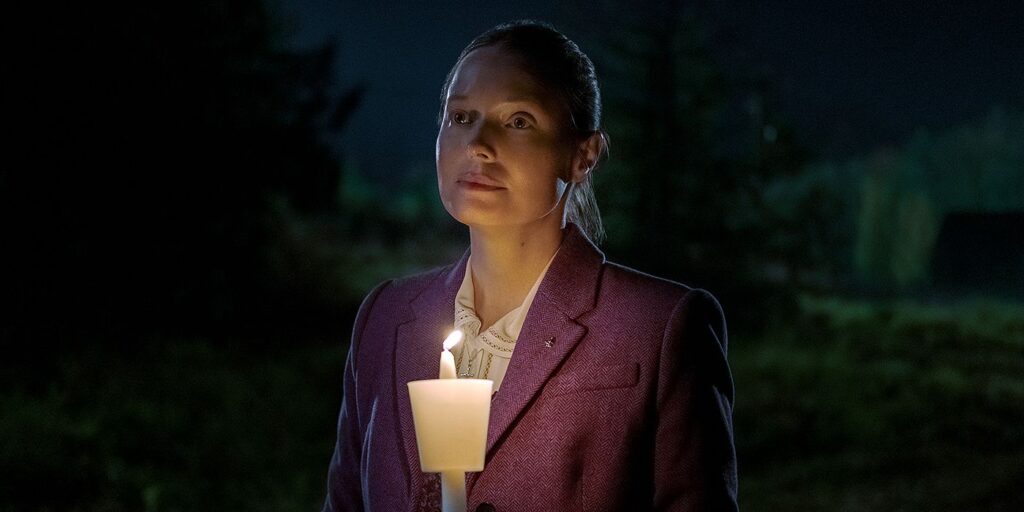God of Power, God of Fear: Religion and Self-Righteousness in ‘Midnight Mass’

This piece contains heavy spoilers for Mike Flanagan’s Midnight Mass.
Mike Flanagan specializes in exploring the world beyond death. Both The Haunting of Hill House and The Haunting of Bly Manor use horror to examine a central question: what happens when we die? Where do our loved ones go after the brief moment when the life we’ve cherished is snuffed out? Netflix’s new limited series Midnight Mass is perhaps his most personal examination of this question to date.
This story of a small island community beset with horrific miracles has long been a passion project for Flanagan. Given the personal nature of its content, it’s easy to see why. Midnight Mass is both an exploration of death and an indictment of the way human beings try to subvert it. The residents of Crockett Island long to understand the mysteries of the afterlife with devastating results. While some find peace in a god of their own understanding, others seek a god of power and attempt to overcome their fear of death by exploiting others.
Crockett Island’s longtime Monsignor, Father John Pruitt (Hamish Linklater), fears death. Old and confused, he wanders away from his group on a trip to the holy land and into the den of an unholy monster. He’s attacked by a winged vampire, ancient and evil. Alone, terrified, and certain to die John twists his horrible fear into a miracle. He awakens as a decades-younger version of himself, the creature’s magic blood having rejuvenated him. Seeking to understand, he convinces himself that he’s seen an angel on the road to Damascus.
Related: ‘Midnight Mass’ Is Shocking, Heart-Breaking, and a Little Too Long-Winded
Like the apostle Paul, he tells himself he’s been chosen to spread a miracle rather than an insidious curse. Unable to comprehend what he’s seen, his mind desperately clings to a story that gives him power. Masquerading as a young priest named Paul, he takes the beast back to his home. There, it preys on the members of his congregation.

John’s belief that his new condition is a gift is reinforced when he is able to “heal” his young parishioner Leeza (Annarah Cymone). Struck by a stray bullet, she’s been paralyzed from the waist down for years. But during communion, John calls her to step out of her wheelchair. Suddenly, she finds that she is able to walk again. This healing is a result of the vampire’s blood John has secretly been mixing with communion wine. But to the congregation, it appears to be a miracle from God. The powerful potion is reverting everyone in town to their most powerful state in preparation for life as a vampire. While Leeza’s recovery is joyous, it is also a harbinger for the tragedies to come.
Dr. Sarah Gunning (Annabeth Gish) attempts to study Leezaa’s blood, searching for a scientific reason for her condition. But Leezaa’s parents refuse. They give a multitude of reasons, but the reality is that they fear this miracle, if questioned, will be taken away just as quickly as it was given. Their daughter’s entire life was changed in the blink of an eye by a random act of tragedy. Their beliefs tell them gGd is responsible for everything under heaven and earth. So what’s to stop him from undoing this newfound joy?
Related: Rahul Kohli Has Us Too Excited About Netflix’s MIDNIGHT MASS
Aiding Father John in his plan is Bev Keane (Samantha Sloyan). Pious and self-righteous, she’s taken it upon herself to cast judgment on the town and scold them for any behavior she disapproves of. When she discovers that John has become a vampire himself, she embraces his deception. Bev hides her fear in blind devotion and protecting his newfound power because it benefits her. Unable to control his thirst for blood, John accidentally kills the newly sober Joe Collie (Robert Longstreet), leaving his body on the floor. When Bev sees the results of this carnage, she has little concern for the victim. This Christian, who’s supposed to love everyone, steps right over his bloody body and embraces his killer. Joe’s life is cast aside as an inconvenient casualty of war.
Bev lies to the congregation, a practice she previously used to siphon the town’s relief money after a devastating oil spill to fund her vanity project, the church’s rec center. Seeing another opportunity to amass power, she orchestrates a devious plan for the entire town to drink poison as a part of a midnight mass on Easter Sunday. Infected by the blood they’ve been drinking, they will return to life as vampires. Then they’ll spread Bev’s perverted “gospel” to the mainland and gaining power over everyone she deems not worthy of this unholy salvation.
Related: Mike Flanagan Now Brings SOMETHING IS KILLING THE CHILDREN to Netflix
Believing herself to be the purest of all, her hypocrisy is staggering. She justifies her blatant sins with scripture, twisting Bible verses and parables to suit her cruel judgments. Bev claims to believe in a god of love, but what she really worships is power. Her fear of losing control prompts her to use Christian teachings and practices to cast those who do not subscribe to her extreme beliefs as shameful heathens unworthy of love and forgiveness.

The night of the conversion begins with a moving candlelit procession through the town, but ends in a blood-soaked nightmare. As the ancient vampire looms over them, most of the town is trapped in the sanctuary. John encourages a perfectly healthy man to drink poison, reassuring him as he dies in front of the congregation. When he miraculously comes back to life, John justifies the horrifying act with uplifting scripture. His rousing oration continues as Bev passes out cups of the poison to the congregation. As parishioners die then return to life, their thirst for blood overtakes them; they begin to feast on the remaining churchgoers. The entire ordeal is accompanied by the unceasing sounds of John’s charismatic sermon. He calls on scripture and motivational language to lead his congregation into these atrocities.
Related: Mike Flanagan Announces Filmmakers Helming Episodes of THE MIDNIGHT CLUB
John’s misguided actions come from a fear of losing his loved ones to death. Having had a long-ago affair with Mildred Gunning, the two kept their love a secret so as not to destroy the lives of Mildred’s husband and their secret child, Sarah. He desperately wants another chance at the life he watched from afar, afraid of admitting his true feelings. The rules of his faith demand his celibacy and that he abandon his human desires for godly ones. But John succumbed to being human. How much pain could have been averted if he had just had the courage to exist as his authentic self? Yes, it would have caused pain. But truly believing in a god of love and acceptance means there would have been forgiveness available for him. His fear of rejection leads him to initiate the deaths of his entire congregation.
In the final episode of Midnight Mass, Annie Flynn (Kristin Lehman) reveals the truth underneath Bev’s own hypocrisy in a brutally honest takedown of her lifestyle. She tells Bev what she likely already knows: she’s not a good person. She is cruel and callous, but God loves her anyways just as he loves any sinner. Wanting to believe she’s special, Bev rejects the humanity and salvation of anyone she deems unworthy of it. Her god is a god of power and she only wants his love if it is unavailable to others. After orchestrating the entire town’s transformation into vampires, she burns all shelters except for her own church rec center. Standing in front of the only safe space left in down, she delights in cruelly turning people away. This need for power hides a deep insecurity and fear that she is not worthy of the heavenly love she desires.
Related: Horror History: Happy Birthday to the Master of New Scary Movies, Mike Flanagan!
Fear is a natural response to the mysteries of death. Though we may believe many things, none of us know for sure what will happen when our bodies cease to function. Bev seeks a god that gives her power over her fears by validating her feelings of superiority. She believes that love is conditional and only granted to those she deems pious and pure.
Erin Greene (Kate Siegel) finds her god in collective worship and community support. Her understanding of a higher power may be channeled through religious beliefs, but it involves an honest love that transcends pain. It doesn’t overpower fear by diminishing others, but helps to release it by granting the peace of larger understanding. Riley Flynn (Zach Gilford) finds his god in acceptance of his place in the world and the tragedy his addiction has caused. Leeza finds her god in forgiveness for the man who shot her. Rather than power, they find a peace that allows them to accept their fears and face them with the support of those who love them.
It’s human nature to want to find the grand design in our suffering. We want to understand why bad things happen to us. While looking at the stars, Riley describes cavemen who created mythology and religion to explain the natural phenomena of an unknown world. As humans, we cannot see the full scope of our relationship to the larger universe so we try to rationalize and justify. When Erin discovers that she’s lost her unborn baby, she desperately searches for a reason for this devastating tragedy. But the painful truth is that there is often no reason for the horrors we must endure. Sometimes bad things happen without explanation and assigning purpose to our suffering allows us to process the pain. In the midst of our sorrow, sometimes the hardest thing to admit is that we may never know why our lives unfold the way they do.
Related: Mike Flanagan Wants YOU To See SAINT MAUD Right Now
It would be easy to read Midnight Mass as anti-religion. But Bev’s god of fear is a false idol she uses to increase her own power on Earth. She tells herself she is holy, but we see in her final moments that deep down she knows the truth. Erin finds peace in the moments of her death because she has sacrificed herself to save others. She looks at the stars and releases herself into the love she feels around her. Bev looks at the rising sun and feels desperate fear. For all of her self-righteous conviction, she reverts to a frightened child. In the face of her fear, she finally sees that she chose the wrong path.
We must each find meaning in our lives. Some call this meaning God, some call it love, some call it a higher power. It goes by many names, but an honest understanding and acceptance of life’s unpredictability always end in the same place. We must find a way to believe that our lives are worth living. That our existence, however random, can have meaning. When random tragedy befalls us, we must find a way to believe that we will get through it; that though our bodies will eventually return to dust, our actions will live on in the hearts of others. That’s what we mean when we say faith. That’s what we mean when we say, God.
Categorized: Editorials
